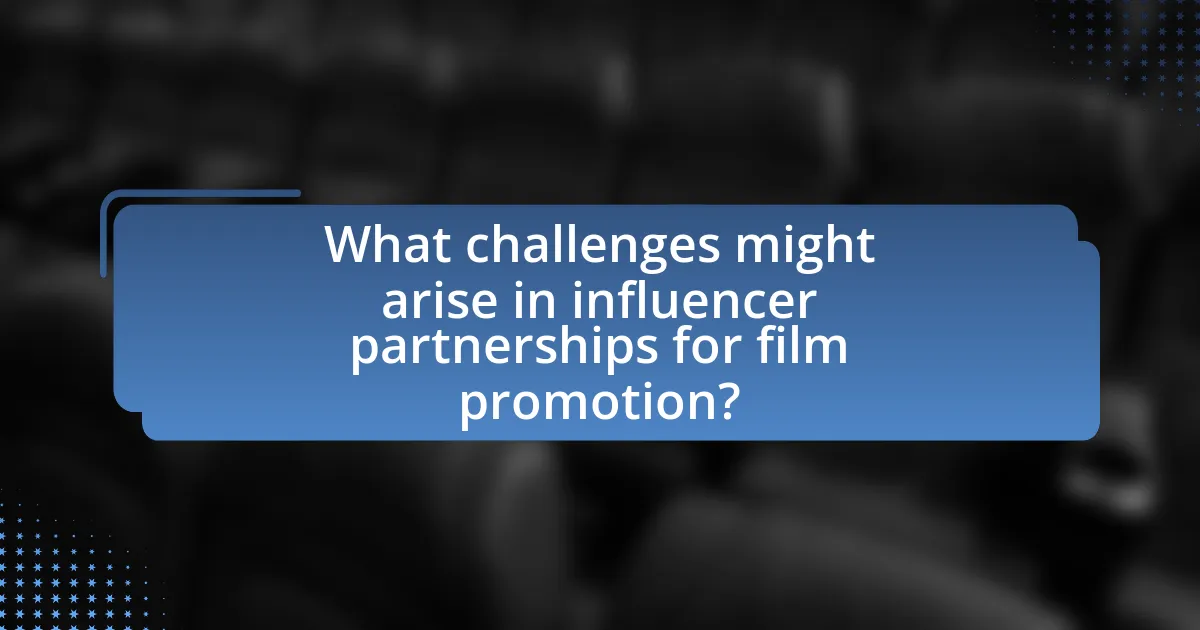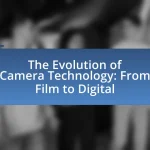Building partnerships with influencers for film promotion involves collaborating with social media personalities to enhance a film’s visibility and reach. This strategy capitalizes on influencers’ credibility and audience engagement, significantly impacting consumer behavior and driving ticket sales. Key elements of successful partnerships include alignment of values, clear communication, and measurable goals, which collectively enhance audience engagement and foster authentic connections. The article also explores the importance of selecting the right influencers, assessing audience alignment, and tracking campaign effectiveness through metrics such as engagement rates and ROI, while addressing potential challenges and best practices in influencer collaborations.

What is Building Partnerships with Influencers for Film Promotion?
Building partnerships with influencers for film promotion involves collaborating with individuals who have a significant following on social media or other platforms to enhance the visibility and reach of a film. This strategy leverages the influencers’ established credibility and audience engagement to create buzz, generate interest, and drive ticket sales. Research indicates that 49% of consumers depend on influencer recommendations, highlighting the effectiveness of this approach in reaching target demographics and fostering authentic connections with potential viewers.
How do influencer partnerships enhance film promotion?
Influencer partnerships enhance film promotion by leveraging the influencers’ established audiences to create authentic engagement and reach. Influencers possess the ability to connect with their followers on a personal level, which can lead to increased interest and excitement around a film. For instance, a study by the Digital Marketing Institute found that 49% of consumers depend on influencer recommendations when making purchasing decisions, indicating that influencer endorsements can significantly impact audience behavior and film viewership. By collaborating with influencers, filmmakers can tap into niche markets and demographics that traditional marketing methods may overlook, ultimately driving ticket sales and enhancing brand visibility.
What are the key elements of successful influencer partnerships?
Successful influencer partnerships are built on alignment of values, clear communication, and measurable goals. Alignment of values ensures that the influencer’s audience resonates with the film’s message, enhancing authenticity and engagement. Clear communication establishes expectations and fosters collaboration, which is crucial for executing effective campaigns. Measurable goals, such as specific engagement metrics or sales targets, provide a framework for evaluating the partnership’s success. Research indicates that campaigns with defined objectives and aligned values achieve up to 11 times higher ROI compared to those without.
How do influencers impact audience engagement for films?
Influencers significantly enhance audience engagement for films by leveraging their established trust and reach within specific demographics. Their ability to create relatable content and authentic narratives around a film can lead to increased interest and anticipation among their followers. For instance, a study by the Digital Marketing Institute found that 49% of consumers depend on influencer recommendations when making purchase decisions, including movie tickets. This demonstrates that influencers can effectively drive audience engagement by fostering a sense of community and excitement around a film’s release.
Why are influencers important in the film industry?
Influencers are important in the film industry because they significantly enhance film promotion and audience engagement. Their large and dedicated followings allow filmmakers to reach targeted demographics effectively, often leading to increased box office sales and viewership. For instance, a study by the Digital Marketing Institute found that 49% of consumers depend on influencer recommendations when making purchase decisions, highlighting their impact on consumer behavior. Additionally, influencers can create authentic connections with audiences, fostering trust and excitement around film releases, which traditional marketing methods may struggle to achieve.
What role do influencers play in shaping public perception of films?
Influencers significantly shape public perception of films by leveraging their large followings and credibility to create buzz and generate interest. Their reviews, endorsements, and social media posts can influence audience opinions and viewing decisions, often leading to increased ticket sales and viewership. For instance, a study by the University of Southern California found that films promoted by influencers received 30% more engagement on social media platforms compared to those without influencer support, demonstrating their impact on audience perception and behavior.
How can influencers help in reaching target demographics?
Influencers can help in reaching target demographics by leveraging their established trust and engagement with specific audience segments. Their ability to create authentic content resonates with followers, making promotional messages more effective. For instance, a study by the Digital Marketing Institute found that 49% of consumers depend on influencer recommendations for their purchasing decisions, highlighting the significant impact influencers have on consumer behavior. By collaborating with influencers who align with the film’s themes and target audience, filmmakers can effectively enhance visibility and engagement within those demographics.

What strategies can be employed to build effective partnerships with influencers?
To build effective partnerships with influencers, brands should focus on aligning values and goals with the influencer’s audience. This alignment ensures that the partnership resonates authentically with the influencer’s followers, increasing engagement and trust. Research indicates that 49% of consumers depend on influencer recommendations for their purchasing decisions, highlighting the importance of selecting influencers whose values match the brand’s message. Additionally, establishing clear communication and expectations from the outset fosters a collaborative environment, which can lead to more creative and impactful promotional content. Engaging influencers in the creative process can also enhance authenticity, as they can tailor the message to their audience effectively.
How can filmmakers identify the right influencers for their projects?
Filmmakers can identify the right influencers for their projects by analyzing the influencer’s audience demographics, engagement rates, and content relevance. This process involves researching influencers who align with the film’s target audience and thematic elements. For instance, a study by Influencer Marketing Hub indicates that 63% of marketers believe that audience engagement is more important than follower count, emphasizing the need for filmmakers to prioritize influencers with high engagement levels. Additionally, tools like social media analytics platforms can provide insights into an influencer’s reach and audience interests, ensuring a strategic match between the influencer’s brand and the film’s message.
What criteria should be considered when selecting influencers?
When selecting influencers for film promotion, key criteria include audience alignment, engagement rates, content quality, and authenticity. Audience alignment ensures that the influencer’s followers match the target demographic of the film, which is crucial for effective promotion. Engagement rates, measured through likes, comments, and shares, indicate how actively the influencer interacts with their audience, reflecting their influence and reach. Content quality assesses the aesthetic and thematic relevance of the influencer’s posts to the film’s message, while authenticity evaluates the influencer’s credibility and genuine connection with their audience. Research shows that 61% of consumers trust influencer recommendations, highlighting the importance of these criteria in maximizing promotional impact.
How can filmmakers assess an influencer’s audience alignment?
Filmmakers can assess an influencer’s audience alignment by analyzing demographic data, engagement metrics, and content relevance. Demographic data includes age, gender, location, and interests of the influencer’s followers, which can be obtained through analytics tools like Instagram Insights or YouTube Analytics. Engagement metrics, such as likes, comments, and shares, indicate how actively the audience interacts with the influencer’s content, providing insight into audience loyalty and interest. Additionally, evaluating the relevance of the influencer’s content to the film’s themes or target audience ensures that the partnership resonates with potential viewers, enhancing promotional effectiveness.
What are the best practices for collaborating with influencers?
The best practices for collaborating with influencers include selecting the right influencers, establishing clear communication, and creating authentic content. Selecting influencers whose audience aligns with the film’s target demographic ensures that the promotional efforts reach the intended viewers. Establishing clear communication involves setting expectations regarding deliverables, timelines, and compensation, which fosters a productive partnership. Creating authentic content allows influencers to present the film in a way that resonates with their followers, enhancing engagement and credibility. Research indicates that 49% of consumers depend on influencer recommendations, highlighting the effectiveness of these practices in driving audience interest and engagement.
How should filmmakers approach influencers for partnerships?
Filmmakers should approach influencers for partnerships by conducting thorough research to identify influencers whose audience aligns with the film’s target demographic. This alignment increases the likelihood of effective promotion and engagement. Filmmakers can then initiate contact through personalized messages that highlight mutual benefits, such as exclusive content or early access to the film, which can incentivize influencers to collaborate. According to a study by Influencer Marketing Hub, 63% of marketers believe that influencer partnerships are effective for brand awareness, underscoring the importance of strategic influencer selection and outreach.
What types of content can influencers create for film promotion?
Influencers can create various types of content for film promotion, including social media posts, video reviews, behind-the-scenes content, interviews with cast members, and live Q&A sessions. Social media posts, such as Instagram stories or TikTok videos, can showcase trailers or highlight key themes of the film, reaching a broad audience quickly. Video reviews provide personal insights and critiques, helping to build anticipation among followers. Behind-the-scenes content offers exclusive looks at the filmmaking process, generating interest and engagement. Interviews with cast members can humanize the film and create a personal connection with the audience. Live Q&A sessions allow influencers to interact directly with fans, fostering community and excitement around the film’s release.

What challenges might arise in influencer partnerships for film promotion?
Challenges in influencer partnerships for film promotion include misalignment of brand values, lack of audience engagement, and potential reputational risks. Misalignment occurs when the influencer’s persona or content does not resonate with the film’s target audience, leading to ineffective promotion. For instance, a film aimed at a younger demographic may not benefit from a partnership with an influencer whose audience skews older. Lack of audience engagement can arise if the influencer fails to create compelling content that drives interest in the film, resulting in low conversion rates. Additionally, reputational risks may surface if an influencer becomes involved in controversies, which can negatively impact the film’s image. According to a study by Influencer Marketing Hub, 61% of marketers believe that influencer partnerships can backfire if not carefully managed, highlighting the importance of strategic alignment and audience analysis in these collaborations.
What are common pitfalls to avoid when working with influencers?
Common pitfalls to avoid when working with influencers include failing to align brand values, neglecting clear communication, and overlooking audience engagement metrics. Misalignment can lead to inauthentic promotions that do not resonate with the influencer’s audience, resulting in ineffective campaigns. Clear communication is essential to ensure that both parties understand expectations, deliverables, and timelines; without it, misunderstandings can arise, leading to dissatisfaction. Additionally, ignoring audience engagement metrics can result in partnering with influencers who may have a large following but low engagement rates, which diminishes the potential impact of the promotion.
How can misalignment of brand values affect partnerships?
Misalignment of brand values can lead to ineffective partnerships, resulting in a lack of authenticity and trust between the brands involved. When brands do not share similar values, their messaging may conflict, causing confusion among audiences and diminishing the overall impact of promotional efforts. For instance, a film promoting social responsibility may struggle to partner with an influencer known for promoting luxury and excess, leading to a disjointed campaign that fails to resonate with target demographics. This misalignment can also result in negative public perception, as consumers may view the partnership as inauthentic or opportunistic, ultimately harming both brands’ reputations.
What strategies can mitigate risks in influencer collaborations?
To mitigate risks in influencer collaborations, brands should implement thorough vetting processes for influencers, establish clear contracts, and maintain ongoing communication. Vetting involves assessing an influencer’s audience demographics, engagement rates, and past collaborations to ensure alignment with brand values and target markets. Clear contracts outline expectations, deliverables, and legal protections, reducing misunderstandings and potential disputes. Ongoing communication fosters transparency and allows for adjustments based on performance metrics, ensuring that both parties remain aligned throughout the collaboration. These strategies collectively minimize reputational and financial risks associated with influencer partnerships.
How can filmmakers measure the success of influencer partnerships?
Filmmakers can measure the success of influencer partnerships through key performance indicators (KPIs) such as engagement rates, reach, and conversion metrics. Engagement rates, which include likes, comments, and shares, indicate how well the audience interacts with the content shared by influencers. Reach measures the total number of unique viewers exposed to the influencer’s content, providing insight into the potential audience size. Conversion metrics, such as ticket sales or streaming views attributed to the influencer’s promotion, directly reflect the partnership’s impact on the film’s performance. According to a study by Influencer Marketing Hub, campaigns that effectively track these metrics can yield a return on investment (ROI) of up to $5.78 for every dollar spent, demonstrating the tangible benefits of successful influencer collaborations.
What metrics should be tracked to evaluate campaign effectiveness?
To evaluate campaign effectiveness in building partnerships with influencers for film promotion, key metrics include engagement rate, reach, conversion rate, and return on investment (ROI). Engagement rate measures the level of interaction (likes, shares, comments) relative to the audience size, indicating how well the content resonates with viewers. Reach quantifies the total number of unique users who see the campaign, providing insight into its visibility. Conversion rate tracks the percentage of users who take a desired action, such as purchasing tickets or visiting a website, reflecting the campaign’s effectiveness in driving specific outcomes. ROI assesses the financial return generated from the campaign relative to its cost, ensuring that the investment in influencer partnerships yields profitable results. These metrics collectively provide a comprehensive view of campaign performance and effectiveness.
How can feedback from influencers inform future promotions?
Feedback from influencers can inform future promotions by providing insights into audience preferences and engagement strategies. Influencers often have a deep understanding of their followers’ interests, which can guide brands in tailoring their promotional content to resonate more effectively. For instance, a study by the Digital Marketing Institute found that 70% of consumers are influenced by the recommendations of their peers, highlighting the importance of aligning promotional strategies with influencer feedback. This feedback loop allows brands to refine their messaging, select appropriate platforms, and enhance overall campaign effectiveness, ultimately leading to improved audience reach and conversion rates.
What practical tips can filmmakers follow for successful influencer partnerships?
Filmmakers can achieve successful influencer partnerships by selecting influencers whose audience aligns with their film’s target demographic. This alignment ensures that the influencer’s followers are likely to be interested in the film, increasing engagement and reach. Additionally, filmmakers should establish clear communication regarding expectations, deliverables, and timelines to avoid misunderstandings. Research indicates that 49% of consumers depend on influencer recommendations, highlighting the importance of authenticity in the partnership. Filmmakers should also provide influencers with creative freedom to present the film in a way that resonates with their audience, as this can lead to more genuine content. Finally, tracking the performance of influencer campaigns through metrics such as engagement rates and conversions can help filmmakers assess the effectiveness of their partnerships and make data-driven decisions for future collaborations.


